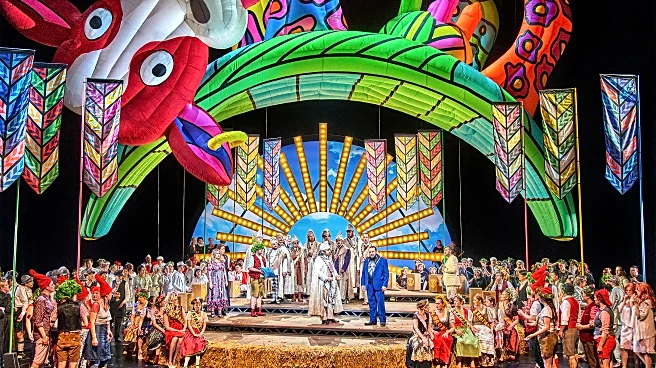BAYREUTH, Germany (AP) — In Wagner's home theater, a twist has been added to the classic opera “Die Meistersinger von Nürnberg.”
Instead of Walther joining the guild of master singers and preparing to marry Eva after he wins the song contest, in Bayeuth's new version she grabs the medal out of the young knight's hands, returns it to her father, then leads her future husband offstage for a future forsaking the traditions of their family and city.
“No
thank you. Let's go!” explained soprano Christian Nilsson, who is singing Eva in her role debut. “She is a strong girl.”
Matthias Davids’ production runs through Aug. 22, emphasizing entertainment with a Hollywood Technicolor look highlighted by an upside-down inflatable cow and a tiny St. Catherine’s Church atop 34 steep steps.
Nilsson's Eva arrives for the Feast of St. John. encased in flowers with additional blossoms in her headdress, carried atop horizontal poles by four men.
“We were always referring to Eva as the prize cow. We said she is sold like a prize cow,” said Davids, a 63-year-old German director known for his work in theater musicals.
That idea led to the huge heifer, manufactured by a company that makes inflatables and covered with flame retardant coating, according to set designer Andrew Edwards.
Sixtus Beckmesser, the petulant town clerk who loses the song contest to Walther, pulls the plug on the cow, which darkens and sags, during the final oration defending the imperative of German art by the cobbler Hans Sachs.
While Sachs runs to restore the connection — reinflating the bovine balloon and restoring light — the young lovers reject him and what he stands for. Townspeople, many wearing conical red caps that give them elf-like looks, shrug their shoulders at the final notes as Sachs and Beckmesser argue upstage.
When “Meistersinger” premiered in 1868, Wagner presented a happy ending in which Walther and Eva joined together and he is admitted to guild. Davids' ending is less jarring than Kasper Holten’s 2017 Covent Garden staging, set in a men's club where Eva is horrified Walther would want to join the misogynistic Meistersingers and runs away in tears.
“I saw some productions and I always found them kind of heavy and meaningful,” Davids said.
He read Wagner's letters about his desire to produce a comedy to earn money and decided to search for lightness and humor while realizing comedy can't constantly sustain over four hours. Details were worked out during rehearsals, with Davids inspired by the chemistry of Nilsson and tenor Michael Spyres, who also was making his debut as Walther.
Nilsson maintains a beatific beam during Walther's prize song.
“I really felt like in this production Eva and Walther truly had a fun connection — fun, young, loving connection — and I just leaned into that and listened to Spyres' beautiful tenor,” Nilsson said.
Davids' contrast was sharp from Barrie Kosky's 2017 production, set partly in Wagner's home of Wahnfried and the Nuremberg trials courtroom, with Walther and Sachs portrayed as Wagner of various ages.
This time Georg Zeppenfeld was a grandfatherly Sachs in an argyle button through sweater vest. Beckmesser, played fussily but without histrionics by Michael Nagy, had a shimmering silver sweater below a cream Trachten jacket, mirror sunglasses and lute transformed to resemble a heart-shaped electric guitar outlined by pink light that gave him an Elvis Presley look. Jongmin Park, an imposing Pogner as Eva's father, was attired in a more flowing robe.
Eva wore a traditional dirndl and Walther, an upstart, a punkish T-shirt. Susanne Hubrich costumed various townspeople to resemble German entertainer Thomas Gottschalk, comedian Loriot, fans of the soccer club Kickers Offenbach and former German Chancellor Angela Merkel.
“Ms. Merkel is a Wagner fan and attends the Bayreuth Festival almost every year,” Hubrich said. “I spoke with her after opening night. She was amused.”
Edwards, the set designer, had orange and yellow spears of light that resemble fairgrounds and included architectural details from the Bayreuth auditorium such as circular lamps in sets of three in the church and seats like the ones the audience was viewing from.
Conductor Daniele Gatti, returning to Bayreuth for the first time since 2011, and the cast were rewarded with a positive reception from a spectators known to make displeasure known after more provocative performances.
“Just looking around the audience, there was a lot more smiles on people’s faces at the end than normally you see at the end of Wagner productions,” Nilsson said.
















